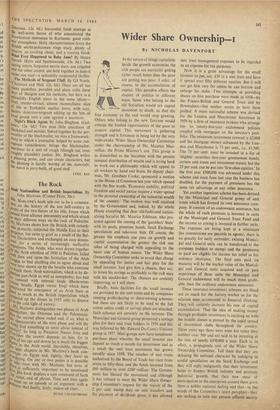The Rock
• den iii .s book displays a sure command of facts • d vistas, and of phrase. Time and time again
k,, LiniS up an episode or an argument with a .en , knee that finally, fairly, makes all clear. MR. MARLOWE'S book sets out to be a commen- ` ,arY on the history of the last half-century in icrots of the two forces of his title, forces which Passed from alliance into enmity and which struck IL1 their different ways on the rock of Palestine. 17r. Marlowe shows how the British, with remark- ante dexterity, subjected the Middle East to their f urPoses, but came to grief as a result of the Bai- lout. Declaration and exchanged an easy domin- ance for a series of increasingly ineffective eflpedients. The Arabs, who were drawn together bY the Arab rebellion of 1936 in Palestine, failed 10th then and upon the formation of the Arab w',cague to find anything else to agree about and e,re later shown up by the Israelis who continue ottulk them. Arab nationalism, which is by de- fion pan-Arab as well as xenophobic, has had ‘,0 contend with internal feuds (Hashemites jrsus Saudis, Egypt versus Iraq) which have nstructed the emergence of an Arab State at ee4st as much as the British imperialism which ffn,nlured up the dream in 1915 only to disown ' , In the cold light of victory. 114M„ TT Marlowe distinguishes two phases of Arab tials'orism, the Ottoman and the Palestinian. tk_ e second phase ended and, if so, what is characteristic of the next phase and will the ahabis find something to unite about instead of ei'fm? So long as President Nasser lives and Qurislles the answer depends on him, for in iteilf his ups and downs he is much the biggest tire, in the Arab world. Inevitably, therefore, eeh later chapters in Mr. Marlowe's book con- ;:t4ile on Egypt and, rightly, they leave us 0-110cring. On one or two points it is possible betake issue with Mr. Marlowe, but none of 4111 is sufficiently important to be mentioned
PETER CALVOC ORESSI






































 Previous page
Previous page